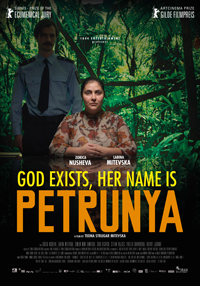Cross to Bear: Mitevska’s Playful Yet Potent Critique of the Heteropatriarchy
 Disarming thanks to its charming tone, which could mistakenly be defined as slight, Macedonian director Teona Strugar Mitevska’s latest film God Exists, Her Name is Petrunya tackles gender parity in an environment where feminism hardly seems a welcome subject. Much lighter in tone than some of Mitevska’s previous work, this could prove to be a breakthrough abroad for the director, who has become one of the most recognizable filmmakers from her country over the past decade. Despite a rather curious sounding plot synopsis specific to a cultural tradition, it’s a universal message on the continual expectation of women’s subjugation told from the perspective of an unexpectedly resilient protagonist, who Mitevska uses to defy not only expectations within in the narrative but ours as well. While a bit rough around the edges in some regards, it’s conceit and execution are enhanced by likeable performances and a thoughtful screenplay.
Disarming thanks to its charming tone, which could mistakenly be defined as slight, Macedonian director Teona Strugar Mitevska’s latest film God Exists, Her Name is Petrunya tackles gender parity in an environment where feminism hardly seems a welcome subject. Much lighter in tone than some of Mitevska’s previous work, this could prove to be a breakthrough abroad for the director, who has become one of the most recognizable filmmakers from her country over the past decade. Despite a rather curious sounding plot synopsis specific to a cultural tradition, it’s a universal message on the continual expectation of women’s subjugation told from the perspective of an unexpectedly resilient protagonist, who Mitevska uses to defy not only expectations within in the narrative but ours as well. While a bit rough around the edges in some regards, it’s conceit and execution are enhanced by likeable performances and a thoughtful screenplay.
In her early 30s and living with her supportive parents in small town Macedonia, Petrunya (Zorica Nusheva) has been living a life of stagnation. Forced into interviewing for a job she’s overqualified for, an opportunity thanks to a friend of the family, prospects for employability remain dubious. Humiliated by the employer, she makes her way home and stumbles upon the local religious tradition, Epiphany, wherein the young men of the town jump into the river to salvage a cross thrown in by the priest, the winner getting to keep the object and acquire what they believe to be a year’s worth of luck. On an impulse, she jumps into the river and nabs the cross, setting off an immediate backlash as women aren’t allowed to participate. As the church demands she return the cross and the police attempt to intervene, a local news station takes up Petrunya’s cause as she refuses to forgo a distinction she claimed for herself.
What it lacks in some regards, including a bit of nuance in directing and maybe a bit of tightening in the prolonged third act, Petrunya more than makes up for in the charisma department. As the eponymous heroine, Zorica Nusheva is quite the find, transforming from sullen and sulky passivity into a woman with determined purpose. Her on-screen presence recalls a wistful nostalgia for the early period of Ricki Lake, where women of all shapes and sizes could defy the odds successfully (when maybe even conversations about measurements and unconventionality weren’t used to define worth). And yet, her appearance is what drives the significance of the story, early on molested and demeaned by a lamentably inadequate man during a laughable job interview. The interaction plays like crass comedy if only for how deplorably empowered male privilege can be wielded. And so, when Petrunya jumps into the river and snatches that little symbol standing for an institution which has systematically held women back since its inception, it’s a transformative catalyst in more ways than one.
In Mitevska’s most noted film to date, her 2007 title I Am from Titov Veles, the director focused on three sisters who are suffocating in their dying community, yearning to live beyond the limited possibilities available to them following the passing of their father. Petrunya similarly navigates this terrain, focusing on one woman who’s been educated but unable to transform her degree in history into a meaningful career—obviously, no one here wants to look back. Countering the draconian attitudes of the village, Mitevska gets a lot of mileage out of Labina Mitevska (the director’s sister and who made her debut in Milcho Manchevski’s 1994 classic Before the Rain) as Slavica, the brazen journalist from Skopje determined to provide coverage on Petrunya’s plight. Vibrant and charismatic, it’s a performance and a character which adds significant levity, often unexpectedly. She’s comedic relief, to be sure, but it’s laced with a determined undercurrent which provides an extra kick to the proceedings.
Mitevska’s third act gets a bit bungled up on repetitive exchanges between the priest, the chief inspector and Petrunya, while an unlikely and rushed bit of intimacy with the kindly and handsome Officer Darko (Stefan Vujisic) feels a bit forced. Still, it’s a curiously interactive and consistently enjoyable feature magnifying the innate and inherent oppression of patriarchal and religious paradigms. In the end, it isn’t about winning a place at their table but making your own.
Reviewed on February 10th at the 2019 Berlin International Film Festival – Competition. 100 Mins.
★★★/☆☆☆☆☆


